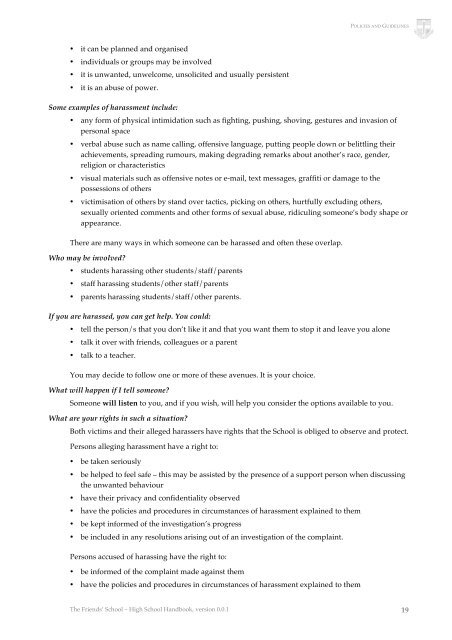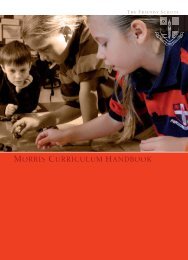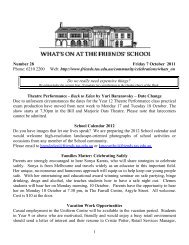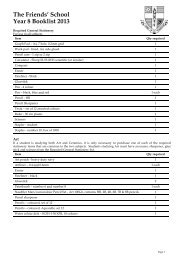POLICIES AND GUIDELINESDue Process<strong>The</strong> term Due Process has evolved to cover the formal steps taken in response to a student’scontinuing lack of co-operation with the <strong>School</strong>’s expectations of a student’s behaviour or workethic. Following a series of discussions with the student concerned, the first formal step is usuallywhen parents are invited to meet with the Head of <strong>School</strong> to discuss the difficulties.If these are not resolved, a meeting is arranged with the Principal who will give a final warning ofthe consequences of continuing problems. A student may be suspended for a period of time toreinforce the seriousness of the situation. A student may also be suspended immediately for seriousbreaches of the <strong>School</strong>’s drug policy, computer ethics statement, physical violence or theft. At thisstage, a code of behaviour or contract may be drawn up which sets out in writing the matters to beaddressed. If this is breached after the final interview with the Principal, the student will be asked toleave the <strong>School</strong>.Students may enter Due Process where their attitude, approach to study and/or work ethic across arange of learning areas becomes an ongoing concern to their teachers. One way of identifying thisconcern is when the student’s progress check or interim report indicates that an improvement isneeded in his/her approach to study. <strong>The</strong> student and his/her parents will be asked to attend aninterview with their tutor and Head of House or Head of <strong>School</strong> to work out ways in which thenecessary improvements can be made. A record of interview will be kept so that the student andhis/her family clearly understand the changes needed and consequences. If a subsequent check orreport does not show the required improvement, a further interview with the parents present willtake place in which strategies to improve the student’s approach to study will be reviewed andreiterated. <strong>The</strong> student will also be advised at this stage that they have formally entered ‘dueprocess’ and that if the required improvements are not made before the next report is issued, a finalinterview will take place and a contract will be drawn up with the Principal. This will include noticethat the student’s enrolment at Friends’ will be terminated if the agreement is breached.Students should also be aware that the classroom management guidelines provide for theirexclusion from individual classes if their ongoing behaviour or attitude is detrimental to others inthe class. This is particularly serious as it may mean that an award or other assessments may not bemade. Parents and students should note that, as per the Conditions of Enrolment, the Principal mayexpel or suspend a student for any adequate cause determined by them. This may occur withoutDue Process being in place.DISCRIMINATION AND HARASSMENT POLICY<strong>The</strong> Friends’ <strong>School</strong> is strongly committed to being a safe, supportive environment which respectsthe rights of the individual, and acknowledges each person’s responsibility to the rest of the <strong>School</strong>community. This is a reflection of our Purpose and Concerns which states that the <strong>School</strong> values ‘theneed to establish peace and justice’. Harassment, discrimination and victimisation threatens thesafety, peace and justice of our <strong>School</strong> environment and will not be tolerated.Direct discrimination is the unfair treatment of someone because of factors such as age, disability,gender, sexuality, race or religion or association with others.Indirect discrimination is the use of rules and requirements which unfairly exclude certain peopleor groups.Harassment is bullying. It is an act of aggression causing embarrassment, pain or discomfort toanother.It can take a number of forms:• physical, verbal, written, gesture, extortion and exclusion<strong>The</strong> Friends’ <strong>School</strong> – High <strong>School</strong> Handbook, version 0.0.1 18
POLICIES AND GUIDELINES• it can be planned and organised• individuals or groups may be involved• it is unwanted, unwelcome, unsolicited and usually persistent• it is an abuse of power.Some examples of harassment include:• any form of physical intimidation such as fighting, pushing, shoving, gestures and invasion ofpersonal space• verbal abuse such as name calling, offensive language, putting people down or belittling theirachievements, spreading rumours, making degrading remarks about another’s race, gender,religion or characteristics• visual materials such as offensive notes or e-mail, text messages, graffiti or damage to thepossessions of others• victimisation of others by stand over tactics, picking on others, hurtfully excluding others,sexually oriented comments and other forms of sexual abuse, ridiculing someone’s body shape orappearance.<strong>The</strong>re are many ways in which someone can be harassed and often these overlap.Who may be involved?• students harassing other students/staff/parents• staff harassing students/other staff/parents• parents harassing students/staff/other parents.If you are harassed, you can get help. You could:• tell the person/s that you don’t like it and that you want them to stop it and leave you alone• talk it over with friends, colleagues or a parent• talk to a teacher.You may decide to follow one or more of these avenues. It is your choice.What will happen if I tell someone?Someone will listen to you, and if you wish, will help you consider the options available to you.What are your rights in such a situation?Both victims and their alleged harassers have rights that the <strong>School</strong> is obliged to observe and protect.Persons alleging harassment have a right to:• be taken seriously• be helped to feel safe – this may be assisted by the presence of a support person when discussingthe unwanted behaviour• have their privacy and confidentiality observed• have the policies and procedures in circumstances of harassment explained to them• be kept informed of the investigation’s progress• be included in any resolutions arising out of an investigation of the complaint.Persons accused of harassing have the right to:• be informed of the complaint made against them• have the policies and procedures in circumstances of harassment explained to them<strong>The</strong> Friends’ <strong>School</strong> – High <strong>School</strong> Handbook, version 0.0.1 19
















